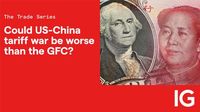The KOF Swiss Economic Institute at ETH Zurich has issued a warning that the Swiss economy is likely to face significant losses due to tariffs imposed by the United States. According to a report published on April 9, 2025, the institute predicts that these tariffs could lead to income losses of up to 0.6 percent, which can be interpreted as a comparable loss in GDP. The tariffs, which currently stand at 31 percent on Swiss goods exported to the U.S., are expected to have a particularly severe impact on Switzerland compared to its European trading partners, such as Germany and France.
In the report, the KOF noted that the current trade policy tensions arising from the U.S. administration's tariff policy pose considerable risks for the export-oriented Swiss economy. "The current trade policy tensions caused by the US administration's tariff policy harbor considerable risks for the export-oriented Swiss economy," the KOF stated. The institute's analysis indicates that if tariffs were to be extended to pharmaceutical products, the economic losses could increase even further.
Duration of these tariffs is another critical factor in determining their overall impact. The KOF warns that if trade barriers continue to escalate, the real income losses could be amplified by a factor of 1.3. This amplification effect underscores how prolonged customs measures could lead to significant structural changes in the economy, which would necessitate costly adjustments in supply chains and production capacities. The KOF estimates that these scaling factors could exceed one, and in extreme scenarios, be significantly higher.
In a related development, UBS, a major Swiss bank, announced on April 8, 2025, that it has lowered its GDP forecasts for the next two years by half a percentage point annually due to the anticipated effects of U.S. tariffs. UBS indicated that the direct impact of these tariffs affects about one-third of Swiss exports to the U.S., with certain categories, including pharmaceutical products and gold exports, being exempt. However, price-sensitive goods, particularly from the machinery and medtech sectors, are expected to bear the brunt of these tariffs.
The repercussions of tariff disputes extend beyond Switzerland, affecting global markets and investor sentiment. On the same day, April 9, 2025, significant volatility was reported on Wall Street, with U.S. stocks reversing gains to close in the red. This turbulence is largely attributed to ongoing tariff tensions between the U.S. and China, where tariffs have reached as high as 104 percent on Chinese imports. Analysts warn that this economic clash could surpass the impacts of both the Global Financial Crisis and the COVID-19 pandemic.
As a result of these tariff disputes, crude oil prices have also seen a dramatic decline, plummeting by 20 percent and breaking through critical support levels. This downturn is linked to recession fears that are dampening global demand. The Australian market, influenced by Chinese economic policies, is similarly under strain, with the Australia 200 index expected to experience further declines if tariffs persist.
The Australian dollar is feeling the pressure as well, with risks of testing pandemic lows. If a liquidity crunch develops, investors may flock to the U.S. dollar as a safe haven. This geopolitical conflict has created a ripple effect across various asset classes, leading traders to closely monitor technical indicators in anticipation of further market movements.
In contrast to traditional markets, the cryptocurrency market has displayed relative stability amid the turmoil. Bitcoin holders appear unfazed by recent corrections, viewing the digital asset as a long-term investment. However, for Bitcoin to initiate a rally, it must surpass the 200-day moving average and break through resistance levels around $89,000 to $90,000. Until these benchmarks are reached, traders should remain prepared for continued pullbacks.
In summary, the economic landscape is being reshaped by tariff disputes, with significant implications for both the Swiss economy and global markets. As nations navigate these turbulent waters, the long-term effects of protectionist measures remain to be seen. The KOF's findings highlight the need for vigilance and adaptability within the Swiss economy, while UBS's forecast adjustments underscore the tangible impacts of U.S. trade policies on financial projections.






